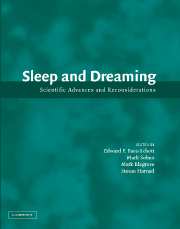Book contents
- Frontmatter
- Contents
- Preface
- Introduction
- 1 Dreaming and the brain: Toward a cognitive neuroscience of conscious states
- 2 Dreaming and REM sleep are controlled by different brain mechanisms
- 3 A review of mentation in REM and NREM sleep: “Covert” REM sleep as a possible reconciliation of two opposing models
- 4 The case against memory consolidation in REM sleep
- 5 The reinterpretation of dreams: An evolutionary hypothesis of the function of dreaming
- Open Peer Commentary and Authors' Responses
- References
- Postscript: Recent findings on the neurobiology of sleep and dreaming
- Index
4 - The case against memory consolidation in REM sleep
Published online by Cambridge University Press: 11 January 2010
- Frontmatter
- Contents
- Preface
- Introduction
- 1 Dreaming and the brain: Toward a cognitive neuroscience of conscious states
- 2 Dreaming and REM sleep are controlled by different brain mechanisms
- 3 A review of mentation in REM and NREM sleep: “Covert” REM sleep as a possible reconciliation of two opposing models
- 4 The case against memory consolidation in REM sleep
- 5 The reinterpretation of dreams: An evolutionary hypothesis of the function of dreaming
- Open Peer Commentary and Authors' Responses
- References
- Postscript: Recent findings on the neurobiology of sleep and dreaming
- Index
Summary
Abstract: We present evidence disputing the hypothesis that memories are processed or consolidated in REM sleep. A review of REM deprivation (REMD) studies in animals shows these reports to be about equally divided in showing that REMD does, or does not, disrupt learning/memory. The studies supporting a relationship between REM sleep and memory have been strongly criticized for the confounding effects of very stressful REM deprivation techniques. The three major classes of antidepressant drugs, monoamine oxidase inhibitors (MAOIs), tricyclic antidepressants (TCAs), and selective serotonin reuptake inhibitors (SSRIs), profoundly suppress REM sleep. The MAOIs virtually abolish REM sleep, and the TCAs and SSRIs have been shown to produce immediate (40–85%) and sustained (30–50%) reductions in REM sleep. Despite marked suppression of REM sleep, these classes of antidepressants on the whole do not disrupt learning/memory. There have been a few reports of patients who have survived bilateral lesions of the pons with few lingering complications. Although these lesions essentially abolished REM sleep, the patients reportedly led normal lives. Recent functional imaging studies in humans have revealed patterns of brain activity in REM sleep that are consistent with dream processes but not with memory consolidation. We propose that the primary function of REM sleep is to provide periodic endogenous stimulation to the brain which serves to maintain requisite levels of central nervous system (CNS) activity throughout sleep. REM is the mechanism used by the brain to promote recovery from sleep. We believe that the cumulative evidence indicates that REM sleep serves no role in the processing or consolidation of memory.
Keywords: antidepressant drugs, brain stem lesions; dreams; functional imaging; memory consolidation; REM deprivation; REM sleep; theta rhythm …
- Type
- Chapter
- Information
- Sleep and DreamingScientific Advances and Reconsiderations, pp. 75 - 84Publisher: Cambridge University PressPrint publication year: 2003
- 4
- Cited by



